Erstellt am: 12. 6. 2010 - 11:59 Uhr
The Beautiful Shame
Everything you've ever heard about South Africa completely fails to prepare you for the realities of the place, from the fairytale beauty of the nature to the ugliness of abject poverty, side by side.
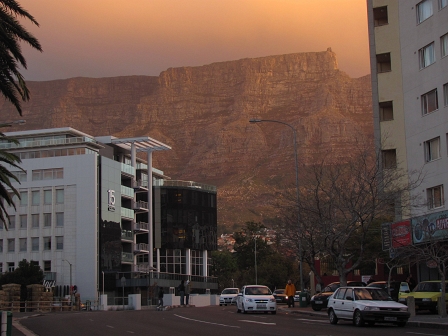
Johnny Bliss, 2010
Alle FM4-Stories zur WM, alle Rundherum-Geschichten aus Südafrika, wie zum Beispiel das grandiose Südafrika-ABC von Anna Mayumi Kerber.
But I take that back. Some of the most beautiful, warmhearted people I have encountered -- ever -- I met in the last two weeks, and number among the impoverished South Africans who live in the townships.
I was lucky to meet some of these at the airport. I got off the plane bewildered in the way only long-distance air travel can do, and probably would have been easy prey for thieves, had there been any around.
Instead I got directions, a new cheap local phone, a power converter, and an invitation to stay for free at the home of one of the fellows who worked at an airport kiosk. The only catch of course was that he lived in the same townships that leave many foreigners quivering with fear.
Call me naive, but I believe the guy was in earnest, even if I have till now lacked the backbone to actually go stay with him.
Oh, did I mention that the people here love football?
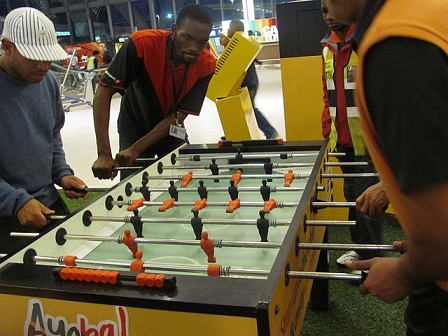
Johnny Bliss, 2010
Well, they do. The excitement over the last couple of weeks has been palpable. No one can really believe that the World Cup is coming to their doorstep. I have never talked so much about the sport as now. I swear you are more or less obliged to become an expert at the game: indeed, it is hard not to become completely indoctrinated in it simply by being here.
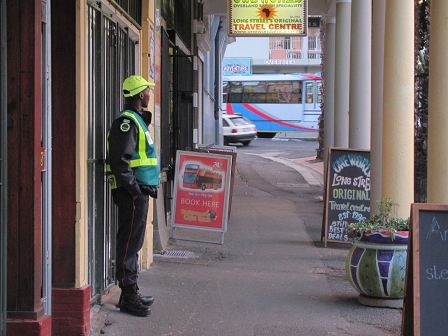
Johnny Bliss, 2010
You see him? That's a security guy. At this point the streets are covered with them. I think FIFA does not want to take any chances. Right now the odds of getting mugged on one of the main tourist drags are very small.
That said, there is definitely still a dodge factor on the streets, especially at night. Not even the locals think it is a good idea to walk, well, anywhere, after the sun goes down.
My first evening walking on the main street, I found myself being followed by four street people at once, and quickly saw the wisdom in taking a cab.
(* - by European standards)
Actually, one of the nicest parts about travelling around the city of Cape Town is the cheap* cab travel. At first I was annoyed by the lack of public transportation and freedom to walk around, but it is like everything else: just something to get used to.
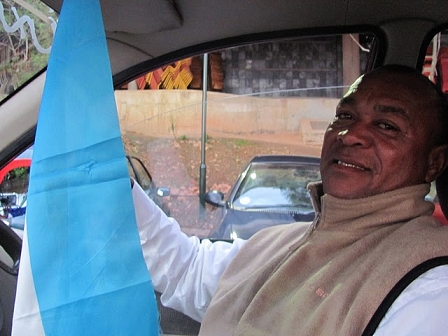
Johnny Bliss, 2010
Meanwhile, rare is the cab driver who does not have a story to tell. This fellow you see above is Mugamod, one such cab driver and a big fan of team Argentine, having family from there. He was rather downcast when I met him because his flag had fallen off the window and been lost.
While we were driving, through some twist of fate, we ended up on the same street he had lost it. Then he slammed on the brakes - there it was!
He ran up the street and picked up the flag, which was miraculously undamaged. I will never forget the gleeful expression on his face as he ran back toward the car. That was an intangible, that was magic. For the rest of the drive, his mood greatly improved, we discussed the prospects for team Argentine in the weeks to come.
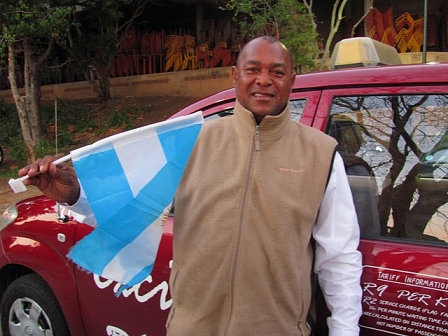
Johnny Bliss, 2010
So anyway, as I've mentioned, the local people here really, really dig football. But when all is said and done, and FIFA and the tourists have all left, what kind of legacy will there be for the poor people who remain?
The Historical Context
The first place to look is the past. In 1995, the year after the historic elections which would vault Nelson Mandela and the ANC to power, South Africa hosted (and won) the Rugby World Cup. It was widely considered to have brought people closer together, and unified the races.
To find out more, I went to a legendary civil rights organization celebrating its 55th year called Black Sash. They had been around to combat apartheid and would, I thought, be in a good position to provide context on the legacy of mega-sporting events in Africa.
"At that point (in 1995), there was a huge tension between races. What the event was able to do was begin to close the gaps, and people were able to celebrate together, collectively, and really see the value from a Nation-building perspective"
, Phelisa Nkomo, the National Advocacy Program Manager of the Black Sash Trust, told me.
Do you see a similar legacy potentially being left from this World Cup this year?
"Well, you'll recall that in 1995 we were looking for unity. But now, fifteen years later, we are looking for economic benefits that are being accrued by a Democratic state. One of the key issues is that the World Cup has not created jobs, as it was assumed it would. You are not going to achieve social cohesion as you did fifteen years ago when the socio-economic rights of ordinary citizens have not been met."
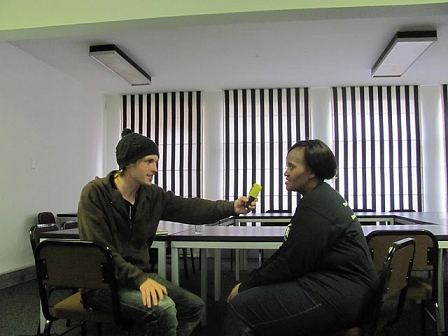
Johnny Bliss, 2010
What are you concerned will happen after the World Cup is over?
"I think our main concern is that we will see more division and increased tensions, and more demand for government to deliver, as a result of the fact that people have not benefitted economically from the World Cup."
After all this talk about poverty, I decided it was time to meet with someone actually living in the townships. Through Phelisa and Black Sash, I got the contacts for an activist and coordinator for Western Cape Anti-Eviction Campaign. His name is Ashraf Cassiem.
We met in a cafe near Parliament.
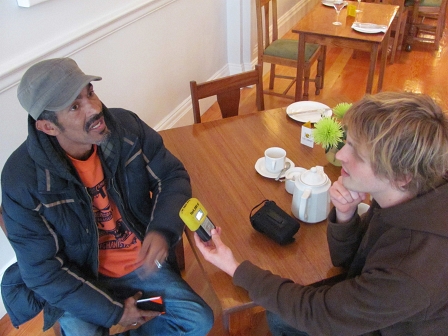
Johnny Bliss, 2010
"For this month, FIFA owns this country, or at least the host cities, because they make the rules, they decide what gets traded, they decide who gets to stand where, they decide on the ticket prices, they decide everything. All they're asking us, is, be quiet, don't come into the city when the World Cup is on, stay in your thirty kilometres away place, and we'll bring you TV. That is the message our government is telling us as poor people, because they made sure the ticket prices are out of our reach."
...thirty kilometres away place?
"Yes, people are being forcibly relocated to a place called Blikkiesdorp, thirty kilometres away. You know, people depend on each other, people depend on networks they've created over years to survive, to live. And by forcibly displacing people, you're cutting all that off. In Blikkiesdorp there's no train line, the bus service is very few and far between, there's taxis and they cost an arm and a leg, it really costs a lot of money to travel. There's no employment out there and you don't have food to bring into your house. This is the new environment created for you, compliments of the World Cup and the city of Cape Town."
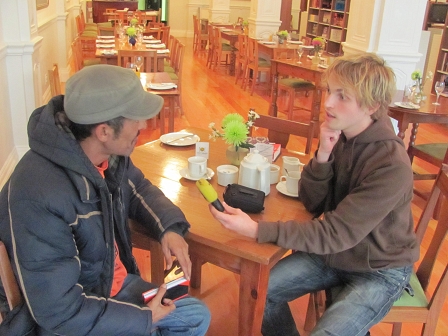
Johnny Bliss, 2010
But is there a bright side for marginalized communities?
"Yes. Everybody loves soccer, and this is a perfect opportunity to attempt to see the stars that they all know. Historically in South Africa, soccer was a uniting thing in communities. We used to play Rebel Soccer, because we were not white, and we couldn't belong to the Union, and soccer always brought our communities together."
Football For Hope
Over the last little while, I'd heard something about a so-called "legacy" project that FIFA was doing for the impoverished communities of South Africa, called Football For Hope.
A little bit of research told me that they have planned twenty stadiums to be spread across the continent, including five in South Africa. According to their website, these centers are designed to "promote public health, education and football in disadvantaged communities across Africa."
One of these stadiums is already built since December, in the neighboring community of Khayelitsha. I was curious to get an opinion on the strengths and weaknesses of these centers from an objective outside source.
Therefore I contacted Score, an international non-profit organisation originating in South Africa, and specialising in community development through sport and recreation. I landed an interview with activists Mari and Lucy, the latter having actually written her thesis on Football For Hope.
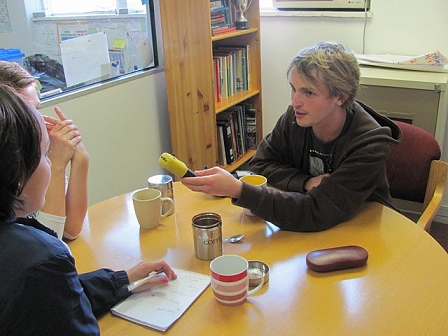
Johnny Bliss, 2010
Will these centers be effective?
"Well, this is the big debate really," Lucy tells me with a deep sigh. "I think one of the most worrying things is the concept itself, in that it's twenty centers - sort of uniform, generic centers - planned in Europe, and then just dropped across the continent.
"Why are we still assuming that Africa is just one uniform place, with the same contexts? How come we have twenty centers which are exactly the same, addressing twenty completely different environments?
"Also when you look at the various disused or under-utilized facilities in the area, we wonder why we aren't putting money into things which would probably better serve the community than building a brand new facility."
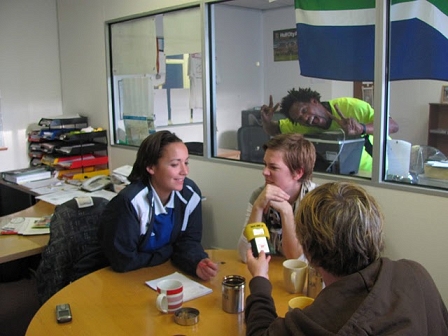
Johnny Bliss, 2010
"Despite such criticisms, I know that Grassroots Soccer have engaged a lot with local voices and government and so on, and they seem to be utilizing the new facility very well."
OK, so they might not be perfect, but they're doing some pretty good stuff.
"Unfortunately I feel that the Football for Hope Center is a very clever, grandiose marketing campaign, and when you compare the size of the marketing campaign to the actual centers - the physical buildings, you know - they are tiny.
"What I will say is, if FIFA really, really cared, if they wanted to invest in social legacy, then there would be far better ways to do that. And that kind of thing takes time."
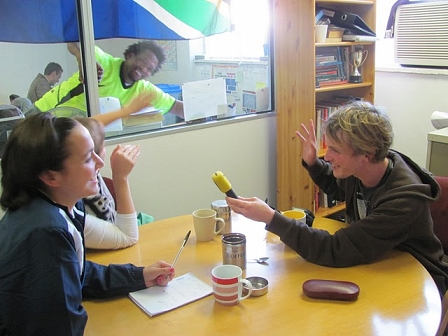
Johnny Bliss, 2010
A Communist who doesn't like Capitalism.
A couple days ago I attended a lecture by a certain Mr. Dale T. McKinley.
I was initially very skeptical of this gentleman, because aside from having a reputation as a firebrand and a Communist, he has a tendency to refer to people as "Comrade" which just sort of throws me off.
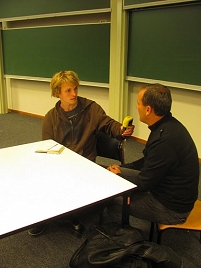
Johnny Bliss, 2010
That said, in real life he seemed very sensible and articulate, and some of what he told me about lead-up to this year's World Cup pretty much blew me away.... off the fence.
"When the bid was initially made, FIFA basically said to South Africa, well do you want this World Cup? And the South African government said yes. So FIFA said, well you have to accept a whole range of guarantees. One of those was to declare all FIFA personnel and businesses tax exempt. So FIFA is not paying a single bit of tax on anything that they do and have done over the past year.
"They also agreed that they would do everything in their power to make sure that there were no disruptions to the World Cup, or people who were marching or demonstrating. So the police commissioner recently announced about a month ago that all marches or demonstrations were banned for the World Cup, suspending the constitutional right of freedom of speech and freedom of assembly. They essentially gave up the democratic right to make decisions on behalf of the people and gave it to an unelected, unaccountable group of old men, who happen to call themselves FIFA and who bring a World Cup to the country.
"They also agreed that they would create exclusion zones around all the stadia, and they would take away all informal sellers. So ordinary poor people who are selling things on the street were removed and only corporate sponsors like Coca Cola, McDonalds and others, are allowed to sell their products. And they agreed with that.
Johnny Bliss, 2010
Links to the mentioned organizations
"What people will see on television will be a very sanitized, nice image of South Africa. They'll see Green Point stadium with Table Mountain in the background, and everybody will go oooh and aaaah, but what they would not know is that the very area on which the stadium was built was home to about two or three hundred homeless people and informal traders, who were forcibly removed to make way for the stadium. And of course what this means is that those who are the most vulnerable and the most marginalized are the ones that are paying the highest price."
What about the intangibles. Will there be perhaps a positive effect on the country which is harder to measure?
"I'm not a very strong believer in ephemeral, feel-good things, because they don't last. That is not to say that there isn't a feeling of excitement in South Africa about the soccer. That's very understandable and I don't want to critique that. But the notion that a World Cup can somehow transcend all the economic realities, the inequalities, the history of oppression, and the struggles in this country that have gone on for decades - that in one month we can get rid of all this because people are going to watch soccer, that's a fairytale. And it's a fairytale I don't think we should buy into, because once the fairytale is over, we will all have to face the reality."


